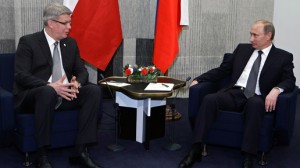RIGA — News that during their brief meeting in Helsinki Russian Prime Minister Vladimir Putin invited President Valdis Zatlers to Russia for May 9 celebrations and that the latter eagerly accepted, sparked a barrage of commentary at home.
Optimists believe that Zatlers’ presence in Moscow will improve bilateral relations, while skeptics think it is a slap in the face to all Latvians who suffered between 1940 and 1991.
However, a brief sojourn in the Russia capital is unlikely to erase even a fraction of the offenses that have accrued over the years. Moscow has always castigated the Baltics, and will continue to do so as long as necessary.

President Valdis Zatlers accepted the invitation during his meeting with Russian Prime Minister Vladimir Putin in Helsinki this week.
Formally, Zatlers hopes that the visit, for the May 9 Victory Day celebrations in Moscow will help improve relations between Latvia and Russia, which by and large are better than those the eastern neighbor has with either Estonia and Lithuania.
“We maintain our view on the history of Latvia and the Baltic states and the Soviet occupation that followed World War II, which brought grave consequences to the Latvian people,” presidential spokeswoman Elina Lazdane told the Baltic News Service on Friday.
“Nevertheless, it is important to prove that Latvia is a mature European Union and NATO member state, which is interested in good neighborly relations with Russia,” she said.
Latvian nationalists criticized the decision, saying that it plays into a Kremlin ploy to split the Baltic states.
“The whole world remembers victims of World War II on May 8, but Russia’s tradition to hold pompous celebrations on May 9 symbolically reminds Latvian citizens of the reoccupation of Latvia by Soviet troops and the subsequent mass deportations,” Maris Grinblats, leader of the national bloc For Fatherland and Freedom/LNNK, told BNS.
“To attend, the Latvian president would have to have very serious reasons that he could explain to the public,” he added.
Lithuania’s President Dalia Grybauskaitė did not receive an invitation despite having a substantial meeting with Putin in Helsinki, although Lithuania asked Putin or Russian President Dmitry Medvedev to come to Vilnius for the 20th anniversary of the declaration of independence next month.
Estonian President Toomas Henrik Ilves has not been invited so far, though he hinted he would go if the opportunity arises. But only three years have passed since the Bronze Soldier mayhem, and it is hard to imagine that the Kremlin would invite the resident of Kadriorg to the Red Square festivities.
Andris Spruds, head of the Latvian Institute of International Affairs, suggested that Zatlers violated protocol by immediately accepting the invitation.
“Zatlers failed to show diplomatic and political composure. He said previously that he would give his answer in late February … and this sends a signal that he had just been waiting for an invitation and there are no substantial issues anymore,” Spruds said. “The president should have consulted or at least created an impression that he had consulted the foreign ministry, other Baltic presidents and the public.”
To be fair, Putin, who is only prime minister, also violated protocol by extending an invitation to a foreign president — something Medvedev should have done.
Nonetheless, many patriotic Latvians feel that Zatlers shouldn’t go anywhere near Russia while events commemorating what essentially amount to the loss of Latvian independence are being held. Ethnic Russians, by contrast, believe it is right for the president to go to Moscow. It is this dichotomy that Zatlers hopes to address.
“The president believes that his participation in the events marking the fall of Nazism and commemorating the victims of World War II on May 8-9 will contribute to uniting society and improving relations between countries,” Lazdane said.
A Zatlers visit to Moscow for Victory Day would not be without precedent. His predecessor Vaira Vīķe-Freiberga went for the 60th anniversary celebration in 2005, even though her Estonian and Lithuanian counterparts stayed home. No no rift in Baltic relations resulted, nor any noticeable improvement in ties with Russia.
Yet some analysts, such as Karlis Drauksts, a foreign policy expert, believe that such visits are helpful. He was quoted by BNS in January as saying that the United States and the EU were realigning relations with Russia and that the Baltic states had an important role to play in this process — thus they should dispatch their leaders to Moscow in May.
More likely, though is that the status quo will continue even if all three Baltic presidents participated in the May 9 ceremonies: Russia will continue to impugn Estonia and Latvia for human rights abuses and embracing fascism and to hold Lithuania hostage by refusing to renew oil supplies to the Mažeikiai refinery, the country’s largest enterprise, until it sells the refinery to a Russian company.
Twenty years on, Kremlin bosses only begrudge the Balts their independence. Just six months ago, Medvedev announced that Russia considers former Soviet republics and satellite states to be within its “privileged” sphere of influence.
Thus, if Zatlers and the other Baltic presidents were to go to Moscow, it should be to pay respects to the millions of people who died defeating Hitler, and not with some puerile notion that come May 10 Russia will begin to look upon the Baltic states as friends.
— This is a paid article. To subscribe or extend your subscription, click here.












